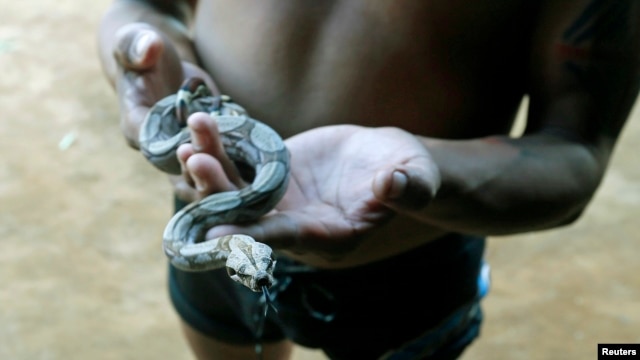The situation has prompted aid groups like Doctors Without Borders to sound the alarm over the imminent shortage of Fav-Afrique, which treats bites from 10 types of snakes. “We are upset about the decision of Sanofi Pasteur to stop Fav-Afrique because we need the anti-venom,” said Dr. Monica Rull, a health advisor for Doctors Without Borders. “We need an anti-venom that is polyvalent and it’s easy to use, not thinking too much about which type of snake has bitten the patient.” The aid group estimates that 30,000 Africans die of snakebites each year.
'Polyvalent' anti-venoms
Rull said there are other anti-venoms available in Africa, but none are as effective as Fav-Afrique, and few are polyvalent — meaning they can treat multiple poisons. That matters because patients often can’t accurately identify the species of snake that attacked them. But the sad story of the demise of Fav-Afrique is a complicated one, says Dr. Jean Lang of pharmaceutical company, who contends governments and donors are equally responsible for this poisonous situation. Lang was part of the team that developed Fav-Afrique two decades ago. He spoke to VOA from Sanofi Pasteur’s facility in Lyon, France.

A member of the Amazonian Tatuyo tribe holds a snake while waiting for tourists in his village in the Rio $#@! (Black River) near Manaus city, Brazil
While tests have shown that Fav-Afrique is very effective, he says his product has commercial disadvantages. Production is lengthy and complicated, and it will take at least two years to make a batch to replace the one that is now expiring. Fav-Afrique has to be refrigerated — a tall order for rural African clinics — and treatment is expensive, with the average patient needing multiple courses that total about $500. “The people who decide at the ministry of health of these African countries, of course considering the price of the product ... when you face a five-fold cheaper product and you consider they are equivalent, because you are not a scientist or a physician,” he said.
Fav-Afrique's demise
When the company decided in 2010 to discontinue Fav-Afrique, they announced they would share the technology with anyone who wanted to resume production. No one has stepped up, Lang says. He says he is worried the death of Fav-Afrique is a symptom of a bigger disease in the healthcare industry. He says his company is urging donors, governments and aid organizations to step up to fund essential pharmaceuticals like vaccines and anti-venoms.
“I think there are vaccines that are also under threat because no one realizes that even with the market failure, we are going below some fair return for investments,” he said. “And that’s apparent to us with the measles vaccine, for example. So there are other vaccines that, if we don’t rethink, most of the new vaccines we are making are driven out of the business cases of our company.” As the boardroom battle rages over who will pay for these lifesaving medications, the burden is now falling to those who can least afford it — patients, who may pay with their lives.
http://www.voanews.com/content/key-a...t/3390646.html


 The Science, Health, and Technology Room
The Science, Health, and Technology Room


 Reply With Quote
Reply With Quote